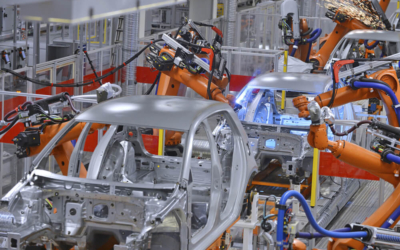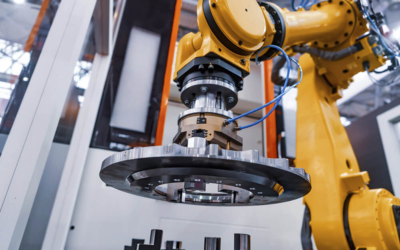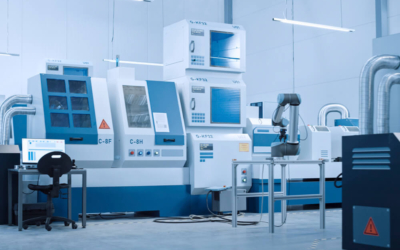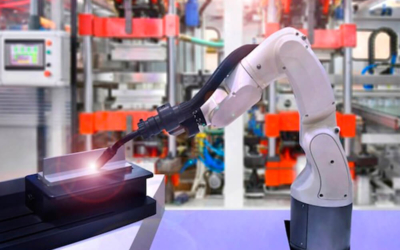In today’s highly competitive business world, companies are always looking for ways to improve their efficiency and productivity. One of the most significant ways to achieve this is by adopting the Internet of Things (IoT) technology. IoT can help businesses monitor their equipment in real-time, analyze data, and make informed decisions to prevent equipment breakdowns. In this beginner’s guide, we will explore the benefits of using IoT to monitor equipment, how it works, the different types of sensors and devices available, and how to set up IoT equipment monitoring.
Blog
Digital Manufacturing
How Digital Transformation is Reshaping Auto Manufacturing
All Content, Automotive, Digital Manufacturing
The automotive industry has experienced several transformations throughout its history. Today’s biggest shift is digital transformation, which is the shift to using entirely digital methods for R&D and other internal business practices. Going digital means more than just using computers, which has been commonplace for over 40 years. So, what makes this transformation so significant? Not only will it greatly speed up vehicle development and reduce manufacturing errors, but it’ll also benefit your business as a whole.
Disruptive Future Industrial Equipment Technologies
All Content, Artificial Intelligence, Automotive, Digital Manufacturing
The industrial equipment sector has been an important aspect of the world economy for a long time. It encompasses a wide range of products and services, including heavy machinery, tools, and automated systems, which are widely used in various industries such as manufacturing or construction.
Safe Flight: The Importance of Aerospace Manufacturing Testing
Aerospace and Defense, All Content, Digital Manufacturing
Aerospace manufacturing is one of the most complex processes, given the incredibly high importance of aircraft reliability. A crash can cripple a company. Boeing’s woes with the 737-MAX severely hampered their growth and limited orders, for example, and those issues could have been avoided with more careful testing and better solutions to issues. With renewed emphasis on safety, aircraft manufacturers expect their suppliers to uphold a higher standard. How can you make your business a better partner for aircraft manufacturing?
Digital Transformation’s Impact on Autonomous Vehicle Development
All Content, Automotive, Digital Manufacturing
There is a clear trend in the automotive industry. Autonomous vehicles are the future of transporation and companies big and small are vying for a piece of this new market. Nevertheless, new markets mean new difficulties. Digital transformation has already been critical to the few successful cases that exist. Companies like Tesla and GM have embraced digital engineering workflows with glowing results. Consider the challenges in designing autonomous vehicles and how going digital makes it easier to overcome them.
What Are the Main Components of an ATE System
Aerospace and Defense, All Content, Digital Manufacturing, Research
The aerospace industry relies on Automated Test Equipment (ATE) systems to enhance testing efficiency, accuracy, and reliability. These systems are an integral part of modern electronics manufacturing, as they help reduce the time and effort required to test each device while providing valuable insights into the manufacturing process.
Cobots: Transforming Industries with Collaborative Innovation
All Content, Digital Manufacturing
The industrial landscape is rapidly changing, and collaborative robots, also known as cobots, are at the forefront of this transformation. This article will explore the advantages of using cobots, the challenges of using cobots, and the ways in which cobots are changing the industrial landscape.
How to Use IIoT to Improve Factory Operations
All Content, Digital Manufacturing
In today’s industrial world, the Industrial Internet of Things (IIoT) is being increasingly leveraged to improve factory operations security and scalability. IIoT is a system of interconnected devices, sensors, and software that can be used to automate and optimize industrial processes. By using IIoT, factories can benefit from improved resource management, greater operational efficiency, and enhanced security. This technology can also help to reduce energy consumption, improve scalability, and enable factories to meet customer demands faster.
Driving Digital Transformation with different types of Data Systems
All Content, Digital Manufacturing, Research
Data is at the center of digital transformation. The more data you can acquire, the more possibilities open up to your company. However, there are a variety of ways to collect data. Data acquisition systems (DAQ) collect data and, together with data analytics software, turn them into useful insights that your company can use to improve its processes and gain an advantage over the competition.
Consider some of the different types of DAQ systems, how to implement them, and the benefits they can bring to your business.
Can Smart Grids Help Solve the Global Energy Crisis?
All Content, Digital Manufacturing, Research
The energy grid is a modern marvel. Nevertheless, its analog nature has proven to be inadequate for today’s energy demand. In order for energy companies to stay competitive, grid infrastructure needs a digital transformation. Smart grid technology can help us cut down on energy consumption, minimize waste, and even integrate new technologies more efficiently. Even more importantly, a smarter grid can help us navigate complex problems, like today’s energy crisis.
Questions to Ask When Planning a Digital Transformation Strategy
All Content, Artificial Intelligence, Digital Manufacturing, Research
A digital transformation is a must for companies to stay competitive in today’s complex and turbulent market. Going digital can make companies much more profitable and enable technologies that increase resilience and adaptability. Nevertheless, going digital is a challenge. In order for the transition to go smoothly, it must be planned out very well. To help you plan your transformation, consider a few important questions before embarking on this important project. Digital transformation companies can facilitate the process.
Making the most out of your production test data
All Content, Digital Manufacturing, Research
Data is the fuel for the right business decisions. If you want your team to make informed decisions, you need to collect, store, and analyze data. In production test, the key to achieving success is using standardized processes, systems, and data to improve development productivity, test station design quality, and operational efficiency.












